LeGenD
MODERATOR

- Joined
- Aug 28, 2006
- Messages
- 15,813
- Reaction score
- 162
- Country
- Location
Politics of agitation
Mubasher Bukhari
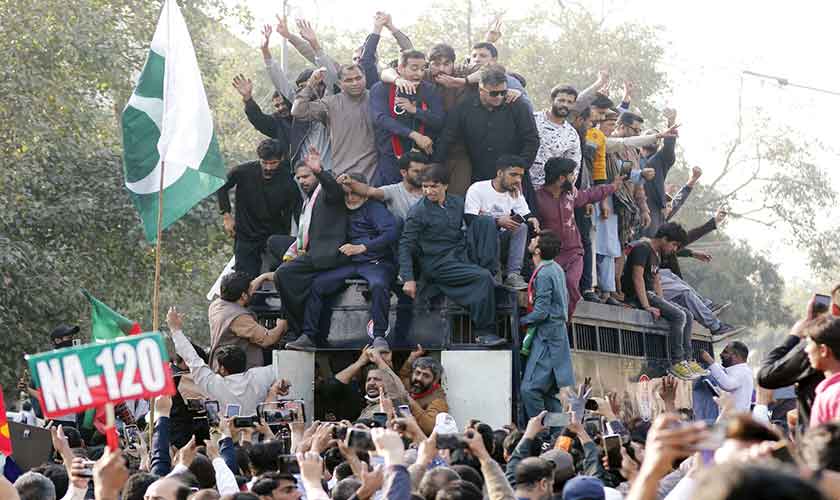
Ever since Imran Khan’s ouster from office, the Pakistan Tehreek-i-Insaf (PTI) has been trying various strategies to return to power. These days, its latest gimmick – the Jail Bharo Tehreek – is making headlines.
Khan and his associates have now vowed to offer themselves up for arrest to compel the government to hold fresh elections. The issue is far from settled even after President Arif Alvi announced a date for elections to the provincial assemblies of the Punjab and Khyber Pakhtunkhwa.
After the success of the no-confidence motion in the National Assembly, Imran Khan developed a narrative that the US, with the help of some local leaders, had hatched a conspiracy to topple his government for saying ‘absolutely not’ to the US demands and developing trade and diplomatic ties with Russia. Later, he launched a long march toward Islamabad in May 2022 that did not yield the desired results. Next, Khan launched another round of street protests during which he was shot at in Wazirabad in July and received bullet wounds in his leg. He, however, kept addressing his supporters through video link. After a few weeks, he announced the resumption of the second phase of the long march and his virtual participation in it. He personally appeared in the last rally in Rawalpindi while using a walking stand in November 2022 and announced his decision to quit all assemblies. However, he and his party took nearly two months to decide on the dissolution of the provincial assemblies of the KP and the Punjab. In both the Punjab and the KP, a majority of the legislators were not in favour of the dissolution. The minority opinion prevailed in the party. After the government still did not announce the date for elections, Khan announced his decision to launch a Jail Bharo Tehreek from February 22.
On the first day of the movement, former ministers Shah Mehmood Qureshi, Azam Swati and Asad Umar as well as Umer Sarfraz Cheema and Dr Murad Raas, among others, reached The Mall and stated: “We are going to jail for achieving real freedom.” They asked the policemen to arrest them and other PTI activists but the police made no move in that direction. Later, the leaders and the supporters boarded prison vans, parked on The Mall. Some of them took selfies and photos while sitting on the vans and left while Qureshi and other leaders and supporters asked the driver take them to the CCPO office. When the vehicle reached there, the leaders asked the police officials to arrest them but they refused. After raising slogans outside the CCPO’s office, the PTI leaders instructed the driver to take the van to Camp Jail in Lahore where they again raised slogans and offered themselves for arrest. When this did not happen, the vehicle was taken to the Kot Lakhpat Jail where the same scene was repeated. Thus, the PTI leaders kept roaming around for several hours. At last, the Lahore deputy commissioner issued their detention orders under Section 3 of the Maintenance of Public Order. The police then took 80 leaders and activists in custody and sent them to Kot Lakhpat Jail.
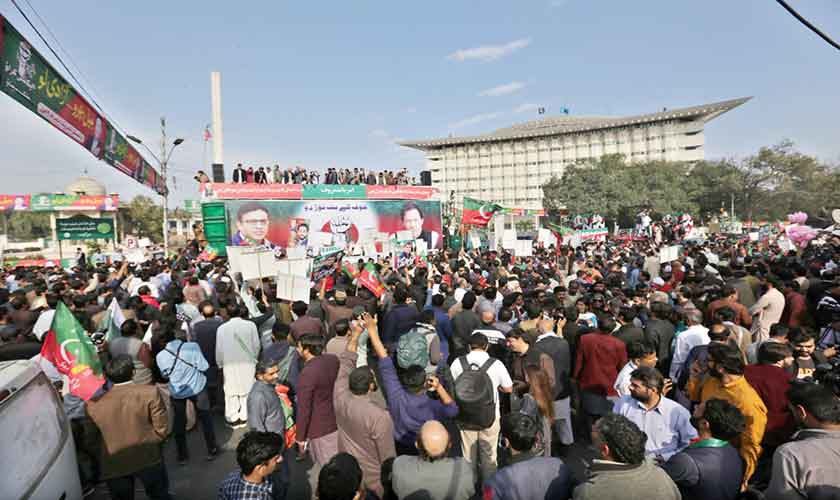
On Thursday, the PTI kicked off the second round of the movement in Peshawar where hundreds of PTI activists gathered at the busy Hasht Nagri Chowk but none surrendered to the police. Later, a group led by former NA speaker Asad Qaiser, arrived at Peshawar Jail to surrender to the jail authorities.
The PTI leaders had expected the police to arrest them for violating Section 144 and release them in a few hours. However, the Prisons Department issued the orders to send them to Mianwali, Attock, Dera Ghazi Khan, Bhakkar, Rajanpur and Layyah jails. The families of the arrested leaders and Ejaz Chaudhry, the PTI’s coordinator for the movement, filed a petition for their release. Zain Qureshi, son of Shah Mehmood, also filed a petition in Lahore High Court. In his petition, he stated that his father had been kept at an undisclosed location. “He should be recovered and presented in the court,” he requested.
On Thursday, the PTI kicked off the second round of the movement in Peshawar where hundreds of PTI activists gathered at the busy Hasht Nagri Chowk but none surrendered to the police. Later, a group led by former NA speaker Asad Qaiser, reached Peshawar Jail to surrender to the jail authorities. However, the jail administration told them that they should go to the police station as they could not let them in without registration of a case. None of the other major leaders surrendered for arrest. In the end, around 100 PTI activists were detained.
Reacting to the move, Interior Minister Rana Sanaullah Khan said the strategy had backfired on the PTI. “Imran Khan should stop dreaming about returning to power. The call for arrests to fill jails got a lacklustre response from the masses. The PTI could gather only around 400 people in the provincial capital of the Punjab.”
According to some PTI insiders, the purpose of the move is to stay politically relevant and visible. They say the goal stands achieved.
Amidst the political tussle between the coalition government and the PTI, President Arif Alvi also announced a date for elections to the Punjab and KP assemblies. This started a debate about the president’s role and authority in such matters.
Later, the Supreme Court of Pakistan took a suo motu notice to determine the relevant authority for setting the date for the elections. Chief Justice Umer Atta Bandial formed a nine-member bench. Justice Jamal Mandokhel expressed reservations about the suo motu notice; pointing out that two petitions had already been moved by speakers of the dissolved assemblies.
“We will have to see if the provincial assemblies were dissolved constitutionally. Can assemblies be dissolved on somebody’s dictation? If a representative is elected for five years, how can the assemblies be dissolved on the direction of an individual,” remarked Justice Mansoor Ali Shah.
Justice Shah added: “We will see if the dissolution of the provincial assemblies is unconstitutional and whether this issue can be resolved through their restoration.”
Before dissolving the Punjab Assembly, former chief minister Chaudhry Parvez Elahi had said that 90 percent of the PTI MPAs had not wanted the assembly’s dissolution. “However, I am following Khan’s direction and forwarding the advice to dissolve the provincial legislature.”
On the other hand, the Pakistan Bar Council has objected to the inclusion of Justice Mazahar Ali Akbar Naqvi and urged the chief justice to include Justice Qazi Faiz Issa and Justice Tariq Masood.
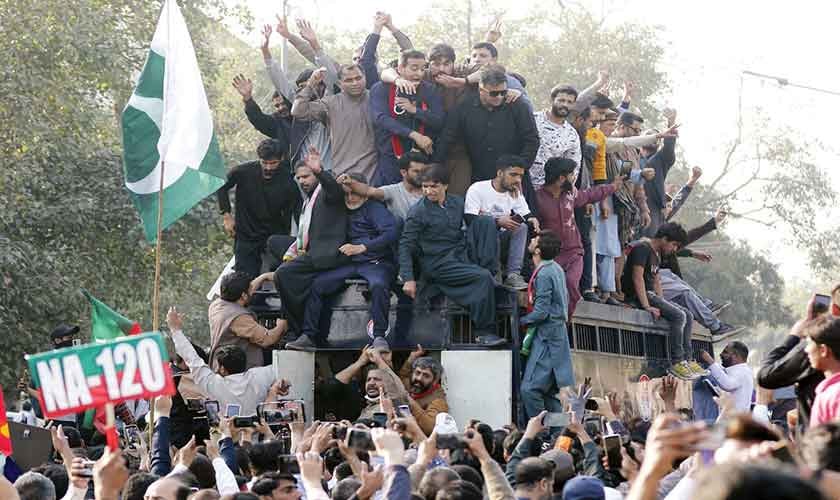
 www.thenews.com.pk
www.thenews.com.pk
Related:
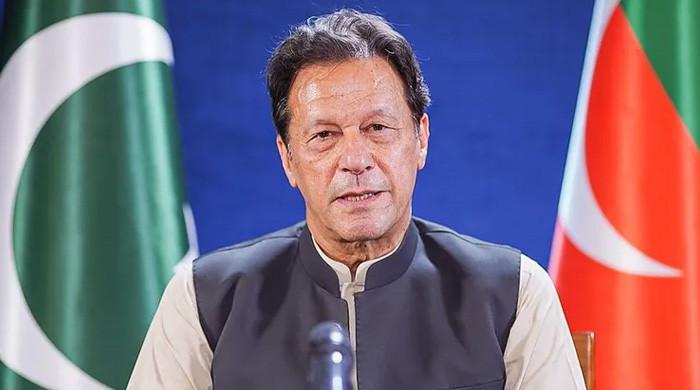
 www.geo.tv
www.geo.tv
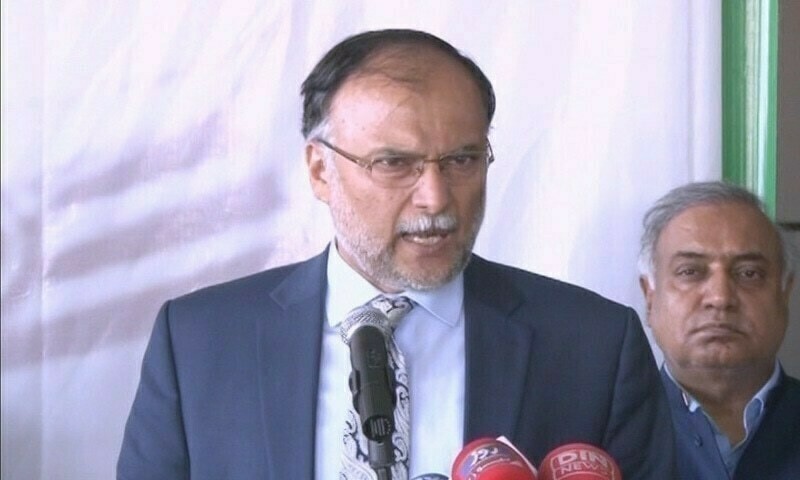
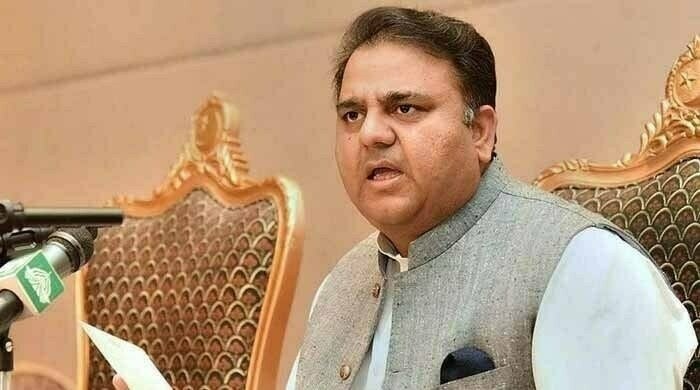
After his ouster last year, Khan had rallied massive amounts of popular support — and demonstrated it in lively rallies around the country and in by-elections held in July and in October. His party, which had been in power in Punjab, Pakistan’s largest province, and in Khyber Pakhtunkhwa, dissolved those two provincial assemblies this January in a bid to force early elections. But that gamble backfired: the state has refused to hold those provincial elections within 90 days as constitutionally mandated and has defied a Supreme Court order saying the Punjab elections needed to be held by May 14.
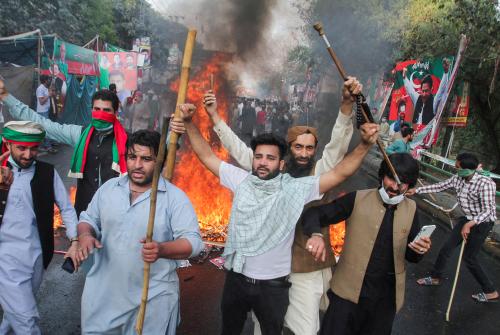
 www.brookings.edu
www.brookings.edu
-----
When Imran Khan was arrested for real on May 9:
Khan was arrested on May 9 from the premises of the Islamabad High Court, whisked away by dozens of paramilitary troops in riot gear, ostensibly for a corruption case. But the manner and timing of his arrest — coming just after he had doubled down on his allegations that a senior intelligence official was responsible for an assassination attempt against him last November — indicated that the arrest was more about the confrontation between Khan and Pakistan’s military which began last spring with his ouster in a vote of no-confidence.
The arrest set off protests on the same day across Pakistan, some of which turned violent and involved vandalism against military installations. In unprecedented scenes, protesters attacked the gate of the army headquarters in Rawalpindi, the corps commander’s house in Lahore, and other buildings, including the Radio Pakistan offices in Peshawar. At least eight people died in clashes with the police. The country’s telecommunications authority shut off access to mobile internet services and social media for several days. In response to the protests, police have arrested thousands of Khan’s party workers, reportedly harassing their families in the process; many of them are yet to be produced in court. They also arrested senior leaders of Khan’s party, the Pakistan Tehreek-e-Insaf (PTI), and key members of his former cabinet: his former foreign minister, finance minister, human rights minister, and information minister.
On May 11, Pakistan’s Supreme Court deemed Khan’s arrest from the premises of a court unlawful, and the Islamabad High Court granted him bail the following day. As he was released, he pointed a finger at one man: Pakistan’s army chief, General Asim Munir.

 www.brookings.edu
www.brookings.edu
The outcome:
Khan’s confrontation with the military has now devolved into an existential, zero-sum fight between the country’s most popular politician and its most powerful institution. Khan, once the military’s favored politician, has since last year stoked popular resentment against the institution, which he blames for his ouster. The attacks on military buildings after Khan’s arrest damaged the institution’s veneer of invincibility. The military — long Pakistan’s sacred cow, its one institution deemed untouchable — has not taken kindly to Khan’s dissent. It has responded forcefully to the protests on May 9 — which it has called a “black day” — saying that violent protesters will be tried in military courts. Trying civilians in army courts would violate Pakistan’s obligations under international human rights law. But Pakistan’s National Security Council backed the military’s decision and its civilian government has lined up behind it, dealing a blow to the constitution and rule of law in the country. This week, an anti-terrorism court in Lahore allowed the handing over of 16 civilians to the military for trials.
In some ways, Khan’s popular support had acted as a buffer over the last year against the military’s assertiveness. But after the protests on May 9, the military establishment has reverted to its usual playbook for political leaders and parties that fall out of line in Pakistan. In this, it is using the pliant coalition government as its partner, as it has in the past with the government of the day. For its part, the government, in its eagerness to comply with the establishment, has been all too willing to forget the lessons of the past, when it itself had been at the receiving end of the establishment’s ire.
Senior leaders of the PTI, part of Khan’s inner circle, have been rearrested repeatedly even after being granted bail over the last two weeks. This week, they buckled under mounting pressure and have been leaving the party, one after the other. Shireen Mazari, the former human rights minister, who had been arrested five times over two weeks, was the first in the top ranks to quit this week. Fawad Chaudhry, the former information minister, followed suit. Party stalwart and close Khan aide Asad Umar announced that he was stepping down from his leadership positions within the party immediately following his release from jail. Among the PTI’s senior-most leaders, only former Foreign Minister Shah Mehmood Qureshi, still incarcerated, remains with the party. Other prominent party members have also resigned. The government says it is considering a ban on the PTI.
Pressuring politicians to quit or switch parties has long been part of the Pakistani establishment’s playbook, which allows it to maintain an iron grip on politics. Khan had been the beneficiary of such maneuvering prior to the 2018 election. But the ferocity of the pressure and the speed of the defections this time around have taken even seasoned observers of Pakistan’s politics and its civil-military machinations by surprise.
Meanwhile, the coalition government has taken on a separate confrontation with the chief justice of Pakistan’s Supreme Court, alleging that Pakistan’s judiciary is biased in favor of Khan. Parts of the judiciary are now pitted against one other.

 www.brookings.edu
www.brookings.edu
Related:
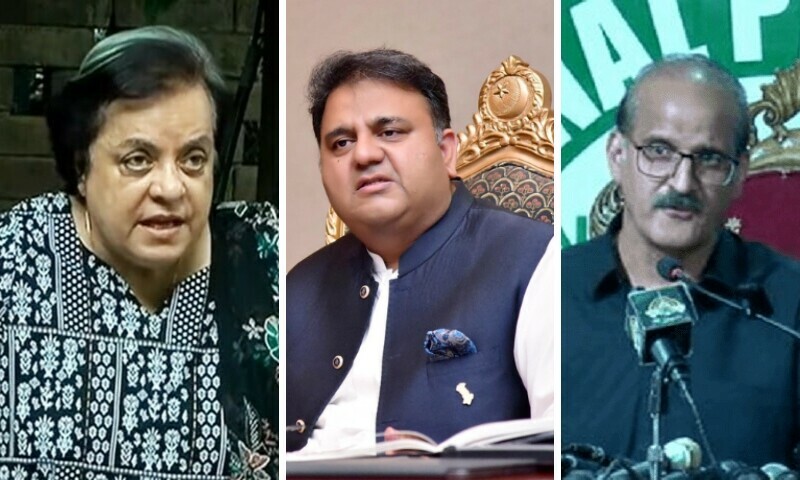
 www.pakistantoday.com.pk
www.pakistantoday.com.pk
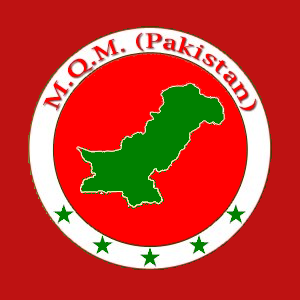
 pakobserver.net
pakobserver.net
-----
A NON-POLITICAL DISCUSSION ON POLITICS OF AGITATION
INAM UL HAQUE
All forces in Pakistan must unite for healing touch our country badly needs. Lest prejudice and scorn burn us all down
The infamy of May 9, 2023 would go a long way in the institutional memory and political history of Pakistan, when rioters from Punjab, the core of Pakistan, approached and forced a retreat on the serving Corps Commander, also from Punjab, ransacked and vandalised Jinnah House, the property of the founder of Pakistan, now the residence of the Lahore, the provincial Corps Commander.
There are hundreds of ways to control a mob without resorting to deadly violence and any military leader worth his training knows it well, but the worthy commander decided to use none and let the crowd get away with trophies from his house, while his family was still inside. Contrary to other cities, not a single aerial shot was fired to disperse the mostly gullible crowd led by non-so gullible leaders. This is command failure is spectacular, monumental, and shameful. It begets an inquiry and consequences that such situations demand.
This anti-army violence was immature, emotive, and politically suicidal. When the dust settles down, Pakistan Tehreek-e-Insaf, unfortunately, will pay the political price for it and will continue to do so despite the short-term brownie points. The party leadership would have been ten feet taller, had Imran Khan announced to his rank and file; this was a legal and constitutional battle, to be fought legally in the courts and in the legislature of Pakistan, not on its streets. Khabardar! Nobody would resort to violence, especially against the army that belongs to all, is for all, and is from all.
He instead acted with youthful intolerance of Lahori adolescence, or an agitated player in the locker room. Although he secured his release by mob-beating the system, especially the country’ judiciary, he ‘seemingly’ lost the wider war on May 9, 2023. This one battle won would continue to haunt him and his party for years to come. What a dreadful change of roles.
Some party stalwarts urged people on national media to come out of homes during the height of the crisis, perhaps expecting a revolution. An insight into our demography would have educated them about ‘no revolutions but occurrence of uncontrolled violence’ in such situations. The episode raises questions about IK (and others’) combative leadership style, politicians’ obsession with power at all costs; their (mis)use of party cadre with abandon; and their use of legalities and other codal niceties as mere steppingstones towards the ultimate objective of grabbing power. IK, particularly in this process, has constrained his own and PTI’s ranking leadership’s political options, by cornering himself in a tight spot, due to his bad politics, even if wildly popular. Grumbling within the party and its exploitation by others, would be a logical outcome.
Consequently, Pakistan today is a laughingstock, with all institutions weakened and society deeply polarised and divided. One has not seen battle lines drawn so clearly and defended so vehemently before. When the rest of the world is pursuing prosperity, peace, and progress, we the hapless citizens of mumlikat-e-Khudadad and our leaders are pursuing petty politics...politics and only politics. The dust will settle, and if today is any guide, ultimately there would be elections; PTI would ‘probably’ win with larger majority or a landslide; will form a government again, perhaps learning no lessons from the past…but dividing Pakistan would always remain a stigma, the party will have to deal with. Soul-searching and applying brakes to emotions now may help, but the long-term forecast is unsettling. Rise to the top is heady and intoxicating, but the fall is more painful. Examples galore.
Now let’s come to the other actors. PDM jumped the bandwagon of the regime change operation in April 2022, inviting the curse of Ramazan, bribing, and manipulating its way to the corridors of power by using an ex-army chief. All to defang the NAB, shelve cases against its leaders, launch some budding dynasts at the center-stage, to be trained at the cost of Pakistan, and in the process make some more money in the free-flour-distribution schemes and many other ventures, for example.
Its ‘apparently’ benign takeover when the economy was already reeling under inflation, circular debt and the burden of servicing external debt, was not so simple, so pro Pakistan and so emotionally patriotic as PDM claims it to be. The cabal had and has deep personal and financial stakes in clinging to power, no matter the country be damned, the army manipulated, and the people exploited and discarded, like waste plastic.
The economic indicators of their year-long stint in power, the many follies of their misrule, and its defiant rejection of the constitution of Pakistan …a [sacred] document miraculously put together and agreed upon by all political forces in 1973 - and its diatribes against the superior Judiciary, are other stigmas, it has earned with due diligence.
Yes, in comparison to the pygmies of PDM, PTI stood tall; but attacks on police, army, and government infrastructure, deeply personal outbursts and humiliating slurs; and an incessant anti-army campaign on social media (‘apparently’ augmented cunningly by wizards of PDM, ‘probably’ to entrap the PTI; and PTI taking the bait, or doing it of its own volition), now perceptually levels PTI to PDM. The PDM narrative from here own, will gain traction, as PTI has shot itself in both feet. One sees a lot of promise in the mature rhetoric and politics of PPP.
The Judiciary. From the meek verdicts supporting the ‘Nazria-e-Zaroorat’ to the conflicting and politically motivated verdicts of recent years… the judiciary, at least on the surface, lacks ‘principle’ in its judgements and has propensity to steer these towards technicalities and legal niceties. No affront meant, and gleaning from the obvious like a common citizen, it seems that splits within and among the judiciary’s rank and file and with the bar, and its judicial activism and overreach has affected its image, prestige, and acceptability to political forces across the board. Lordship to ponder.
When the military umpire is weakened, it is the judicial umpire, who has to fill the void and steady the national ship. This unfortunate reality remains the essence of our ‘guided democracy’ and shall remain so in our ‘patronage-addicted’ system for the foreseeable future. The proponents of ‘haqeeqi azadi’ need to know that tinkering too hard will break the system into lawlessness, and not a revolution, they mistakenly believe is possible. If a revolution indeed was a possibility, attempt on IK’s life was a logical starting point. Some book reading about historic constants of our demography and sociology would put a lot of sanity into the revolutionaries of contemporary Pakistan, who get messed up by reading Habib Jalib, Faiz Ahmed Faiz, and Ahmed Faraz.
The Military. It, particularly the army, will always remain a crucial player, interceding, mediating, persuading, and arbitrating political disputes and steadying political forces towards possible nationalist outcomes. It is not a matter of choice; it is the diktat of our unfortunate and yet to mature political circumstances. When leaders are entrenched in their petty, narrow-minded, and hapless mindsets and pursuits, there has to be someone to pull them out and conjure a compromise. With the military on the back foot or beholden to a presumed interest, the drift is inevitable. The results of last one year’s rudderless reign of ruin is a stark reminder. A sociology, that is too tribal, too biradari dominated, and too entangled in circles within circles, the military will always be the arbiter of last resort, mostly alongside and sometimes without the judiciary.
Any army chief wields immense power, clout and has profound leverage, domestically and internationally. Denying this is hiding the sun behind the index finger. He needs to know his power, his place, and his prestige. Elevation from three to four-stars and appointment as the army chief are overwhelming developments. And in our context, with a steep learning curve, it is akin to climbing a fast-moving train.
The chief also, in mid to long-term, does not remain beholden to any political camp for his elevation, the politicians having exercised their options. And for him the prestige, honour, safety, and welfare of Pakistan comes first… always and every time. The same for the Army comes next… always and every time. And his own prestige, honour, safety, and welfare comes last…always and every time. Any chief worth his office, who deviated from this unalterable truism, was discredited, loathed, and despised. One does not need to go far in history.
Traditionally, the magic touch of the four-star baton for national interest, to heal divisions and rifts, and provide impetus to a stalled political process, bogged down among fat egos, has always been welcome and appreciated by masses, even to the dislike of Chief’s one-time political benefactors. COAS is his own man, answerable only and only to his constituency…the serving and retired soldiery, his conscience, and his country. Forceful intercession from behind the scenes was always felt even if invisible. Examples galore.
So where do we go from here. Towards shunning fat egos and sitting down for a dialogue towards fair and free elections most likely in October but not beyond, finding a way to redress the constitutional violation as a one-time aberration, not repeatable. Meanwhile, assemblies be dissolved, and an agreed caretaker set-up put in place. IK ‘might’ stage a comeback, but then let him fail after the ballot, rather than unconstitutionally, setting wrong precedents. Even if it is repeat of a failed experiment, so be it, as that is what the popular pulse wants. So, give it to the people…nurturing, maturing alternative leadership in the process.
The substitute course of action is disastrous. In the PTI-PDM standoff, in K-P, GB, Balochistan fringe-versus-the Punjab Core (as the stand-off will inevitably turn), we might lose the coherence of our Federation. And then… Allah forbid, there would be no Pakistan to defend, no system to lord over, and no country to do politics. Hate is colour-blind. All forces must unite for the badly needed healing touch, as prejudice and despise will burn us down.
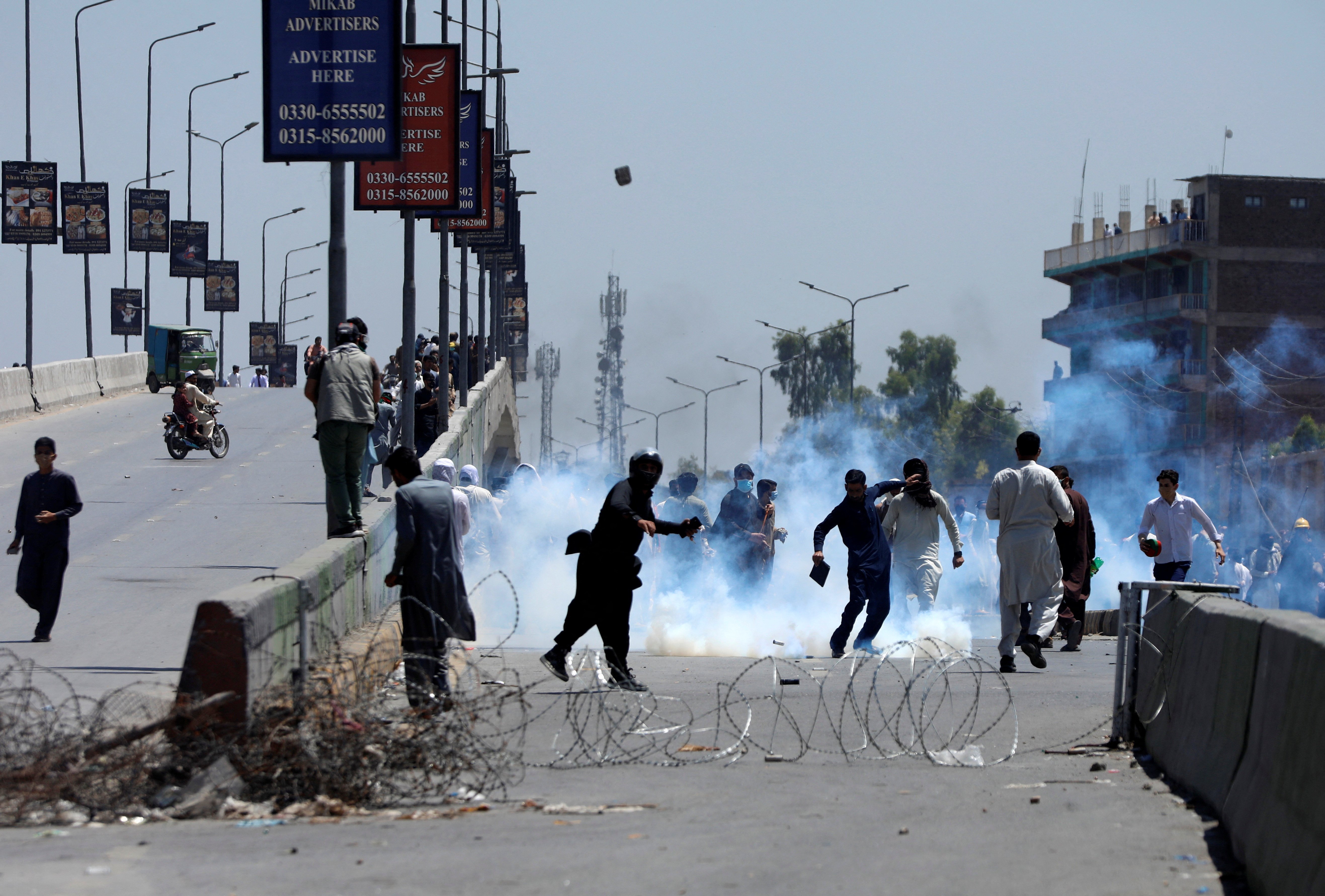
 tribune.com.pk
tribune.com.pk
Related:
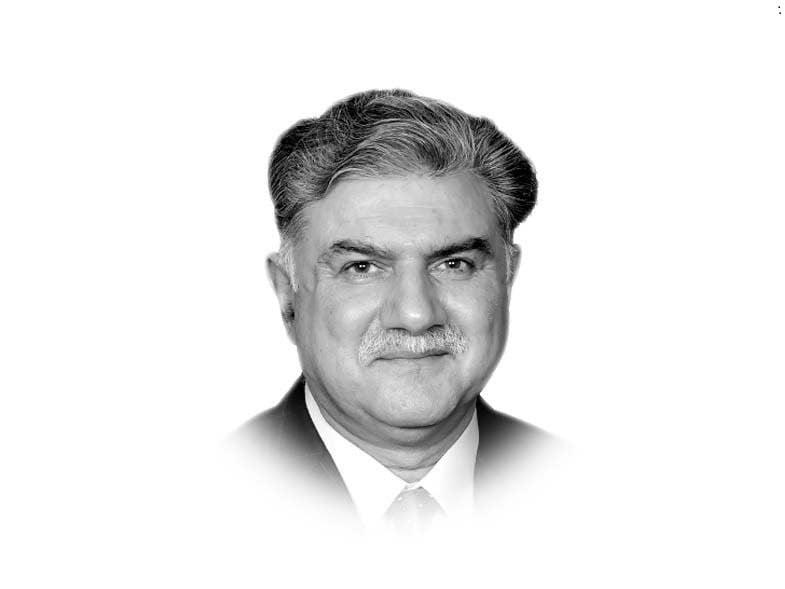
 tribune.com.pk
tribune.com.pk

 www.brookings.edu
www.brookings.edu
-----
Questions:
1. Does PTI seem to have political foresight and and a sound political strategy?
2. Should PTI revisit its political strategy?
3. Should PTI create a fact-finding system and not overrely on select Social Media influencers for information?
4. PTI can win in the next General Elections or PPP is gaining ground?
-----
Thoughts:
Anti-army bashing and violence is immature, emotive, and politically stupid in my view. The army was good when it supported PTI? The army is bad when it distanced itself from PTI due to its miscalculations among other issues?
There is a need for constructive criticism of the institutions to show them the mirror.
There is a need for judicial reforms in the country - corrupt individuals irrespective of party affiliations and positions should be made accountable as per the Rule of Law.
The Supreme Court of Pakistan should have its own Law Enforcement Special Forces to make sure that its rulings are respected and implemented. Pakistan is a banana republic otherwise.
Politics of agitation should not be a norm. Overreliance on protests and street power for political gains and benefits is dangerous and can set in motion a sequence of cascading events that can have lasting impact and consequences. It can backfire as well.
There is a need for defining political ethics. Political narrative-building should be grounded in Facts and Figures and not aimed to incite unrest and violence. Public should be encouraged to reflect on institutions with constructive criticism and vote for change in elections. Corruption charges and cases are best handled through legal channels.
Only educated people should be allowed to contest for elections.
Pakistani diaspora should focus on convincing host countries to not grant political asylum to convicted individuals and facilitate money laundering. How sincere are these host countries to begin with?
Mubasher Bukhari

Ever since Imran Khan’s ouster from office, the Pakistan Tehreek-i-Insaf (PTI) has been trying various strategies to return to power. These days, its latest gimmick – the Jail Bharo Tehreek – is making headlines.
Khan and his associates have now vowed to offer themselves up for arrest to compel the government to hold fresh elections. The issue is far from settled even after President Arif Alvi announced a date for elections to the provincial assemblies of the Punjab and Khyber Pakhtunkhwa.
After the success of the no-confidence motion in the National Assembly, Imran Khan developed a narrative that the US, with the help of some local leaders, had hatched a conspiracy to topple his government for saying ‘absolutely not’ to the US demands and developing trade and diplomatic ties with Russia. Later, he launched a long march toward Islamabad in May 2022 that did not yield the desired results. Next, Khan launched another round of street protests during which he was shot at in Wazirabad in July and received bullet wounds in his leg. He, however, kept addressing his supporters through video link. After a few weeks, he announced the resumption of the second phase of the long march and his virtual participation in it. He personally appeared in the last rally in Rawalpindi while using a walking stand in November 2022 and announced his decision to quit all assemblies. However, he and his party took nearly two months to decide on the dissolution of the provincial assemblies of the KP and the Punjab. In both the Punjab and the KP, a majority of the legislators were not in favour of the dissolution. The minority opinion prevailed in the party. After the government still did not announce the date for elections, Khan announced his decision to launch a Jail Bharo Tehreek from February 22.
On the first day of the movement, former ministers Shah Mehmood Qureshi, Azam Swati and Asad Umar as well as Umer Sarfraz Cheema and Dr Murad Raas, among others, reached The Mall and stated: “We are going to jail for achieving real freedom.” They asked the policemen to arrest them and other PTI activists but the police made no move in that direction. Later, the leaders and the supporters boarded prison vans, parked on The Mall. Some of them took selfies and photos while sitting on the vans and left while Qureshi and other leaders and supporters asked the driver take them to the CCPO office. When the vehicle reached there, the leaders asked the police officials to arrest them but they refused. After raising slogans outside the CCPO’s office, the PTI leaders instructed the driver to take the van to Camp Jail in Lahore where they again raised slogans and offered themselves for arrest. When this did not happen, the vehicle was taken to the Kot Lakhpat Jail where the same scene was repeated. Thus, the PTI leaders kept roaming around for several hours. At last, the Lahore deputy commissioner issued their detention orders under Section 3 of the Maintenance of Public Order. The police then took 80 leaders and activists in custody and sent them to Kot Lakhpat Jail.

On Thursday, the PTI kicked off the second round of the movement in Peshawar where hundreds of PTI activists gathered at the busy Hasht Nagri Chowk but none surrendered to the police. Later, a group led by former NA speaker Asad Qaiser, arrived at Peshawar Jail to surrender to the jail authorities.
The PTI leaders had expected the police to arrest them for violating Section 144 and release them in a few hours. However, the Prisons Department issued the orders to send them to Mianwali, Attock, Dera Ghazi Khan, Bhakkar, Rajanpur and Layyah jails. The families of the arrested leaders and Ejaz Chaudhry, the PTI’s coordinator for the movement, filed a petition for their release. Zain Qureshi, son of Shah Mehmood, also filed a petition in Lahore High Court. In his petition, he stated that his father had been kept at an undisclosed location. “He should be recovered and presented in the court,” he requested.
On Thursday, the PTI kicked off the second round of the movement in Peshawar where hundreds of PTI activists gathered at the busy Hasht Nagri Chowk but none surrendered to the police. Later, a group led by former NA speaker Asad Qaiser, reached Peshawar Jail to surrender to the jail authorities. However, the jail administration told them that they should go to the police station as they could not let them in without registration of a case. None of the other major leaders surrendered for arrest. In the end, around 100 PTI activists were detained.
Reacting to the move, Interior Minister Rana Sanaullah Khan said the strategy had backfired on the PTI. “Imran Khan should stop dreaming about returning to power. The call for arrests to fill jails got a lacklustre response from the masses. The PTI could gather only around 400 people in the provincial capital of the Punjab.”
According to some PTI insiders, the purpose of the move is to stay politically relevant and visible. They say the goal stands achieved.
Amidst the political tussle between the coalition government and the PTI, President Arif Alvi also announced a date for elections to the Punjab and KP assemblies. This started a debate about the president’s role and authority in such matters.
Later, the Supreme Court of Pakistan took a suo motu notice to determine the relevant authority for setting the date for the elections. Chief Justice Umer Atta Bandial formed a nine-member bench. Justice Jamal Mandokhel expressed reservations about the suo motu notice; pointing out that two petitions had already been moved by speakers of the dissolved assemblies.
“We will have to see if the provincial assemblies were dissolved constitutionally. Can assemblies be dissolved on somebody’s dictation? If a representative is elected for five years, how can the assemblies be dissolved on the direction of an individual,” remarked Justice Mansoor Ali Shah.
Justice Shah added: “We will see if the dissolution of the provincial assemblies is unconstitutional and whether this issue can be resolved through their restoration.”
Before dissolving the Punjab Assembly, former chief minister Chaudhry Parvez Elahi had said that 90 percent of the PTI MPAs had not wanted the assembly’s dissolution. “However, I am following Khan’s direction and forwarding the advice to dissolve the provincial legislature.”
On the other hand, the Pakistan Bar Council has objected to the inclusion of Justice Mazahar Ali Akbar Naqvi and urged the chief justice to include Justice Qazi Faiz Issa and Justice Tariq Masood.

Politics of agitation | Encore | thenews.com.pk
Will PTI workers’ arrests force early elections?
Related:

Majority of PTI leadership unhappy with Imran’s intention to dissolve Punjab Assembly first: report
PTI leaders say both assemblies should be dissolved simultaneously.They insist holding local bodies elections will benefit party.Dissolving PA first will create a very negative impression, they say

Ahsan Iqbal terms Punjab Assembly dissolution PTI’s ‘blunder’
Says Maryam Nawaz to return to Pakistan next week.
www.dawn.com

Dissolving assemblies was a mistake: Fawad
LAHORE: Pakistan Tehreek-e-Insaf (PTI) leader Fawad Ch has confessed the mistake of dissolving provincial assemblies...
www.brecorder.com
After his ouster last year, Khan had rallied massive amounts of popular support — and demonstrated it in lively rallies around the country and in by-elections held in July and in October. His party, which had been in power in Punjab, Pakistan’s largest province, and in Khyber Pakhtunkhwa, dissolved those two provincial assemblies this January in a bid to force early elections. But that gamble backfired: the state has refused to hold those provincial elections within 90 days as constitutionally mandated and has defied a Supreme Court order saying the Punjab elections needed to be held by May 14.

Pakistan's always-troubled democracy is on the brink once again | Brookings
Pakistan’s ongoing political crisis has reached a crescendo this month with former Prime Minister Imran Khan’s arrest and its fallout. The contours of the conflict are clear: it is Khan versus Pakistan’s military establishment. And the gloves are off.
-----
When Imran Khan was arrested for real on May 9:
Khan was arrested on May 9 from the premises of the Islamabad High Court, whisked away by dozens of paramilitary troops in riot gear, ostensibly for a corruption case. But the manner and timing of his arrest — coming just after he had doubled down on his allegations that a senior intelligence official was responsible for an assassination attempt against him last November — indicated that the arrest was more about the confrontation between Khan and Pakistan’s military which began last spring with his ouster in a vote of no-confidence.
The arrest set off protests on the same day across Pakistan, some of which turned violent and involved vandalism against military installations. In unprecedented scenes, protesters attacked the gate of the army headquarters in Rawalpindi, the corps commander’s house in Lahore, and other buildings, including the Radio Pakistan offices in Peshawar. At least eight people died in clashes with the police. The country’s telecommunications authority shut off access to mobile internet services and social media for several days. In response to the protests, police have arrested thousands of Khan’s party workers, reportedly harassing their families in the process; many of them are yet to be produced in court. They also arrested senior leaders of Khan’s party, the Pakistan Tehreek-e-Insaf (PTI), and key members of his former cabinet: his former foreign minister, finance minister, human rights minister, and information minister.
On May 11, Pakistan’s Supreme Court deemed Khan’s arrest from the premises of a court unlawful, and the Islamabad High Court granted him bail the following day. As he was released, he pointed a finger at one man: Pakistan’s army chief, General Asim Munir.

Pakistan's always-troubled democracy is on the brink once again | Brookings
Pakistan’s ongoing political crisis has reached a crescendo this month with former Prime Minister Imran Khan’s arrest and its fallout. The contours of the conflict are clear: it is Khan versus Pakistan’s military establishment. And the gloves are off.
The outcome:
Khan’s confrontation with the military has now devolved into an existential, zero-sum fight between the country’s most popular politician and its most powerful institution. Khan, once the military’s favored politician, has since last year stoked popular resentment against the institution, which he blames for his ouster. The attacks on military buildings after Khan’s arrest damaged the institution’s veneer of invincibility. The military — long Pakistan’s sacred cow, its one institution deemed untouchable — has not taken kindly to Khan’s dissent. It has responded forcefully to the protests on May 9 — which it has called a “black day” — saying that violent protesters will be tried in military courts. Trying civilians in army courts would violate Pakistan’s obligations under international human rights law. But Pakistan’s National Security Council backed the military’s decision and its civilian government has lined up behind it, dealing a blow to the constitution and rule of law in the country. This week, an anti-terrorism court in Lahore allowed the handing over of 16 civilians to the military for trials.
In some ways, Khan’s popular support had acted as a buffer over the last year against the military’s assertiveness. But after the protests on May 9, the military establishment has reverted to its usual playbook for political leaders and parties that fall out of line in Pakistan. In this, it is using the pliant coalition government as its partner, as it has in the past with the government of the day. For its part, the government, in its eagerness to comply with the establishment, has been all too willing to forget the lessons of the past, when it itself had been at the receiving end of the establishment’s ire.
Senior leaders of the PTI, part of Khan’s inner circle, have been rearrested repeatedly even after being granted bail over the last two weeks. This week, they buckled under mounting pressure and have been leaving the party, one after the other. Shireen Mazari, the former human rights minister, who had been arrested five times over two weeks, was the first in the top ranks to quit this week. Fawad Chaudhry, the former information minister, followed suit. Party stalwart and close Khan aide Asad Umar announced that he was stepping down from his leadership positions within the party immediately following his release from jail. Among the PTI’s senior-most leaders, only former Foreign Minister Shah Mehmood Qureshi, still incarcerated, remains with the party. Other prominent party members have also resigned. The government says it is considering a ban on the PTI.
Pressuring politicians to quit or switch parties has long been part of the Pakistani establishment’s playbook, which allows it to maintain an iron grip on politics. Khan had been the beneficiary of such maneuvering prior to the 2018 election. But the ferocity of the pressure and the speed of the defections this time around have taken even seasoned observers of Pakistan’s politics and its civil-military machinations by surprise.
Meanwhile, the coalition government has taken on a separate confrontation with the chief justice of Pakistan’s Supreme Court, alleging that Pakistan’s judiciary is biased in favor of Khan. Parts of the judiciary are now pitted against one other.

Pakistan's always-troubled democracy is on the brink once again | Brookings
Pakistan’s ongoing political crisis has reached a crescendo this month with former Prime Minister Imran Khan’s arrest and its fallout. The contours of the conflict are clear: it is Khan versus Pakistan’s military establishment. And the gloves are off.
Related:

Imran revokes party membership of all defectors
Orders their removal from WhatsApp groups; says workers and leaders "facing full force of state terror".
www.dawn.com
Zaidi and Khusro join list of ‘conscience-stricken’ PTI defectors
-- Defending military, another group of 'patriotic' ex-Punjab lawmakers desert opposition party-- Preventive detention of Qureshi, Ejaz, and Maleeka under MPO declared unlawful-- Diplomatic pa
 www.pakistantoday.com.pk
www.pakistantoday.com.pk

MQM eyes Sindh oppostion leader slot after PTI defections - Pakistan Observer
With defections continuing from the Pakistan Tehreek-e-Insaf, the seat of opposition leader in the Sindh Assembly could soon see a change. The PTI had a total of 30 MPAs in the assembly, of which 10 have already left the party. Among other opposition parties, the Muttahida Qaumi Movement has 21...
-----
A NON-POLITICAL DISCUSSION ON POLITICS OF AGITATION
INAM UL HAQUE
All forces in Pakistan must unite for healing touch our country badly needs. Lest prejudice and scorn burn us all down
The infamy of May 9, 2023 would go a long way in the institutional memory and political history of Pakistan, when rioters from Punjab, the core of Pakistan, approached and forced a retreat on the serving Corps Commander, also from Punjab, ransacked and vandalised Jinnah House, the property of the founder of Pakistan, now the residence of the Lahore, the provincial Corps Commander.
There are hundreds of ways to control a mob without resorting to deadly violence and any military leader worth his training knows it well, but the worthy commander decided to use none and let the crowd get away with trophies from his house, while his family was still inside. Contrary to other cities, not a single aerial shot was fired to disperse the mostly gullible crowd led by non-so gullible leaders. This is command failure is spectacular, monumental, and shameful. It begets an inquiry and consequences that such situations demand.
This anti-army violence was immature, emotive, and politically suicidal. When the dust settles down, Pakistan Tehreek-e-Insaf, unfortunately, will pay the political price for it and will continue to do so despite the short-term brownie points. The party leadership would have been ten feet taller, had Imran Khan announced to his rank and file; this was a legal and constitutional battle, to be fought legally in the courts and in the legislature of Pakistan, not on its streets. Khabardar! Nobody would resort to violence, especially against the army that belongs to all, is for all, and is from all.
He instead acted with youthful intolerance of Lahori adolescence, or an agitated player in the locker room. Although he secured his release by mob-beating the system, especially the country’ judiciary, he ‘seemingly’ lost the wider war on May 9, 2023. This one battle won would continue to haunt him and his party for years to come. What a dreadful change of roles.
Some party stalwarts urged people on national media to come out of homes during the height of the crisis, perhaps expecting a revolution. An insight into our demography would have educated them about ‘no revolutions but occurrence of uncontrolled violence’ in such situations. The episode raises questions about IK (and others’) combative leadership style, politicians’ obsession with power at all costs; their (mis)use of party cadre with abandon; and their use of legalities and other codal niceties as mere steppingstones towards the ultimate objective of grabbing power. IK, particularly in this process, has constrained his own and PTI’s ranking leadership’s political options, by cornering himself in a tight spot, due to his bad politics, even if wildly popular. Grumbling within the party and its exploitation by others, would be a logical outcome.
Consequently, Pakistan today is a laughingstock, with all institutions weakened and society deeply polarised and divided. One has not seen battle lines drawn so clearly and defended so vehemently before. When the rest of the world is pursuing prosperity, peace, and progress, we the hapless citizens of mumlikat-e-Khudadad and our leaders are pursuing petty politics...politics and only politics. The dust will settle, and if today is any guide, ultimately there would be elections; PTI would ‘probably’ win with larger majority or a landslide; will form a government again, perhaps learning no lessons from the past…but dividing Pakistan would always remain a stigma, the party will have to deal with. Soul-searching and applying brakes to emotions now may help, but the long-term forecast is unsettling. Rise to the top is heady and intoxicating, but the fall is more painful. Examples galore.
Now let’s come to the other actors. PDM jumped the bandwagon of the regime change operation in April 2022, inviting the curse of Ramazan, bribing, and manipulating its way to the corridors of power by using an ex-army chief. All to defang the NAB, shelve cases against its leaders, launch some budding dynasts at the center-stage, to be trained at the cost of Pakistan, and in the process make some more money in the free-flour-distribution schemes and many other ventures, for example.
Its ‘apparently’ benign takeover when the economy was already reeling under inflation, circular debt and the burden of servicing external debt, was not so simple, so pro Pakistan and so emotionally patriotic as PDM claims it to be. The cabal had and has deep personal and financial stakes in clinging to power, no matter the country be damned, the army manipulated, and the people exploited and discarded, like waste plastic.
The economic indicators of their year-long stint in power, the many follies of their misrule, and its defiant rejection of the constitution of Pakistan …a [sacred] document miraculously put together and agreed upon by all political forces in 1973 - and its diatribes against the superior Judiciary, are other stigmas, it has earned with due diligence.
Yes, in comparison to the pygmies of PDM, PTI stood tall; but attacks on police, army, and government infrastructure, deeply personal outbursts and humiliating slurs; and an incessant anti-army campaign on social media (‘apparently’ augmented cunningly by wizards of PDM, ‘probably’ to entrap the PTI; and PTI taking the bait, or doing it of its own volition), now perceptually levels PTI to PDM. The PDM narrative from here own, will gain traction, as PTI has shot itself in both feet. One sees a lot of promise in the mature rhetoric and politics of PPP.
The Judiciary. From the meek verdicts supporting the ‘Nazria-e-Zaroorat’ to the conflicting and politically motivated verdicts of recent years… the judiciary, at least on the surface, lacks ‘principle’ in its judgements and has propensity to steer these towards technicalities and legal niceties. No affront meant, and gleaning from the obvious like a common citizen, it seems that splits within and among the judiciary’s rank and file and with the bar, and its judicial activism and overreach has affected its image, prestige, and acceptability to political forces across the board. Lordship to ponder.
When the military umpire is weakened, it is the judicial umpire, who has to fill the void and steady the national ship. This unfortunate reality remains the essence of our ‘guided democracy’ and shall remain so in our ‘patronage-addicted’ system for the foreseeable future. The proponents of ‘haqeeqi azadi’ need to know that tinkering too hard will break the system into lawlessness, and not a revolution, they mistakenly believe is possible. If a revolution indeed was a possibility, attempt on IK’s life was a logical starting point. Some book reading about historic constants of our demography and sociology would put a lot of sanity into the revolutionaries of contemporary Pakistan, who get messed up by reading Habib Jalib, Faiz Ahmed Faiz, and Ahmed Faraz.
The Military. It, particularly the army, will always remain a crucial player, interceding, mediating, persuading, and arbitrating political disputes and steadying political forces towards possible nationalist outcomes. It is not a matter of choice; it is the diktat of our unfortunate and yet to mature political circumstances. When leaders are entrenched in their petty, narrow-minded, and hapless mindsets and pursuits, there has to be someone to pull them out and conjure a compromise. With the military on the back foot or beholden to a presumed interest, the drift is inevitable. The results of last one year’s rudderless reign of ruin is a stark reminder. A sociology, that is too tribal, too biradari dominated, and too entangled in circles within circles, the military will always be the arbiter of last resort, mostly alongside and sometimes without the judiciary.
Any army chief wields immense power, clout and has profound leverage, domestically and internationally. Denying this is hiding the sun behind the index finger. He needs to know his power, his place, and his prestige. Elevation from three to four-stars and appointment as the army chief are overwhelming developments. And in our context, with a steep learning curve, it is akin to climbing a fast-moving train.
The chief also, in mid to long-term, does not remain beholden to any political camp for his elevation, the politicians having exercised their options. And for him the prestige, honour, safety, and welfare of Pakistan comes first… always and every time. The same for the Army comes next… always and every time. And his own prestige, honour, safety, and welfare comes last…always and every time. Any chief worth his office, who deviated from this unalterable truism, was discredited, loathed, and despised. One does not need to go far in history.
Traditionally, the magic touch of the four-star baton for national interest, to heal divisions and rifts, and provide impetus to a stalled political process, bogged down among fat egos, has always been welcome and appreciated by masses, even to the dislike of Chief’s one-time political benefactors. COAS is his own man, answerable only and only to his constituency…the serving and retired soldiery, his conscience, and his country. Forceful intercession from behind the scenes was always felt even if invisible. Examples galore.
So where do we go from here. Towards shunning fat egos and sitting down for a dialogue towards fair and free elections most likely in October but not beyond, finding a way to redress the constitutional violation as a one-time aberration, not repeatable. Meanwhile, assemblies be dissolved, and an agreed caretaker set-up put in place. IK ‘might’ stage a comeback, but then let him fail after the ballot, rather than unconstitutionally, setting wrong precedents. Even if it is repeat of a failed experiment, so be it, as that is what the popular pulse wants. So, give it to the people…nurturing, maturing alternative leadership in the process.
The substitute course of action is disastrous. In the PTI-PDM standoff, in K-P, GB, Balochistan fringe-versus-the Punjab Core (as the stand-off will inevitably turn), we might lose the coherence of our Federation. And then… Allah forbid, there would be no Pakistan to defend, no system to lord over, and no country to do politics. Hate is colour-blind. All forces must unite for the badly needed healing touch, as prejudice and despise will burn us down.

A non-political discussion on politics of agitation | The Express Tribune
All forces in Pakistan must unite for healing touch our country badly needs. Lest prejudice and scorn burn us all down
Related:

Political maturity and politics of agitation | The Express Tribune
Direction of agitation also smears of a pre-planned conspiracy

Pakistan's always-troubled democracy is on the brink once again | Brookings
Pakistan’s ongoing political crisis has reached a crescendo this month with former Prime Minister Imran Khan’s arrest and its fallout. The contours of the conflict are clear: it is Khan versus Pakistan’s military establishment. And the gloves are off.
-----
Questions:
1. Does PTI seem to have political foresight and and a sound political strategy?
2. Should PTI revisit its political strategy?
3. Should PTI create a fact-finding system and not overrely on select Social Media influencers for information?
4. PTI can win in the next General Elections or PPP is gaining ground?
-----
Thoughts:
Anti-army bashing and violence is immature, emotive, and politically stupid in my view. The army was good when it supported PTI? The army is bad when it distanced itself from PTI due to its miscalculations among other issues?
There is a need for constructive criticism of the institutions to show them the mirror.
There is a need for judicial reforms in the country - corrupt individuals irrespective of party affiliations and positions should be made accountable as per the Rule of Law.
The Supreme Court of Pakistan should have its own Law Enforcement Special Forces to make sure that its rulings are respected and implemented. Pakistan is a banana republic otherwise.
Politics of agitation should not be a norm. Overreliance on protests and street power for political gains and benefits is dangerous and can set in motion a sequence of cascading events that can have lasting impact and consequences. It can backfire as well.
There is a need for defining political ethics. Political narrative-building should be grounded in Facts and Figures and not aimed to incite unrest and violence. Public should be encouraged to reflect on institutions with constructive criticism and vote for change in elections. Corruption charges and cases are best handled through legal channels.
Only educated people should be allowed to contest for elections.
Pakistani diaspora should focus on convincing host countries to not grant political asylum to convicted individuals and facilitate money laundering. How sincere are these host countries to begin with?

